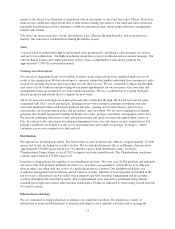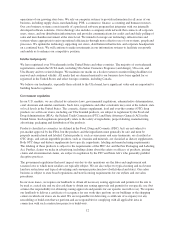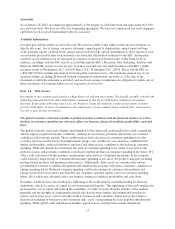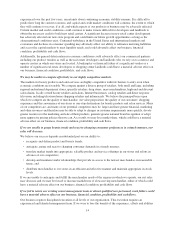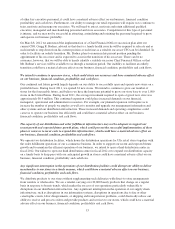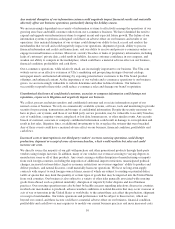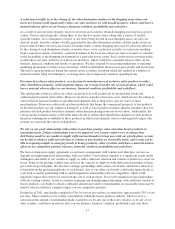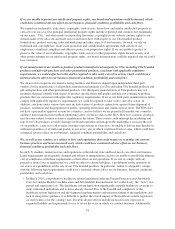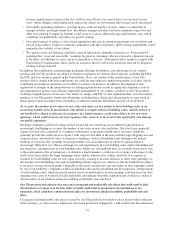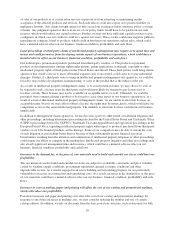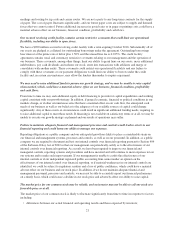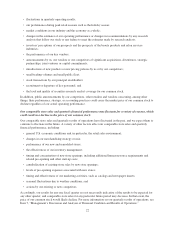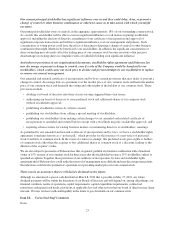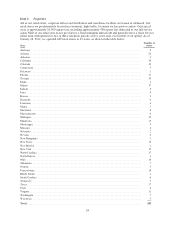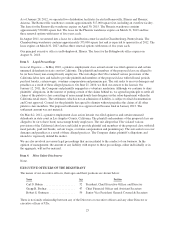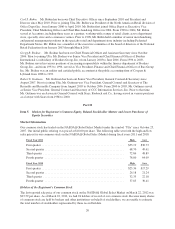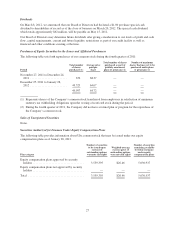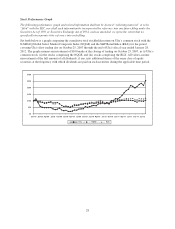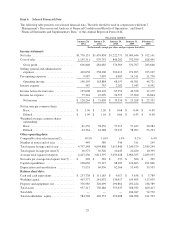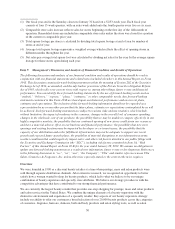Ulta 2011 Annual Report Download - page 25
Download and view the complete annual report
Please find page 25 of the 2011 Ulta annual report below. You can navigate through the pages in the report by either clicking on the pages listed below, or by using the keyword search tool below to find specific information within the annual report.mailings and sorting by zip code and carrier routes. We are not a party to any long-term contracts for the supply
of paper. The cost of paper fluctuates significantly, and our future paper costs are subject to supply and demand
forces that we cannot control. Future additional increases in postal rates or in paper or printing costs could have a
material adverse effect on our business, financial condition, profitability and cash flows.
Our secured revolving credit facility contains certain restrictive covenants that could limit our operational
flexibility, including our ability to open stores.
We have a $200 million secured revolving credit facility with a term expiring October 2016. Substantially all of
our assets are pledged as collateral for outstanding borrowings under the agreement. Outstanding borrowings
bear interest at the prime rate or Libor plus 1.50% and the unused line fee is 0.225%. The credit facility
agreement contains usual and customary restrictive covenants relating to our management and the operation of
our business. These covenants, among other things, limit our ability to grant liens on our assets, incur additional
indebtedness, pay cash dividends and redeem our stock, enter into transactions with affiliates and merge or
consolidate with another entity. These covenants could restrict our operational flexibility and any failure to
comply with these covenants or our payment obligations would limit our ability to borrow under the credit
facility and, in certain circumstances, may allow the lenders thereunder to require repayment.
We may need to raise additional funds to pursue our growth strategy, and we may be unable to raise capital
when needed, which could have a material adverse effect on our business, financial condition, profitability
and cash flows.
From time to time we may seek additional equity or debt financing to provide for capital expenditures and working
capital consistent with our growth strategy. In addition, if general economic, financial or political conditions in our
markets change, or if other circumstances arise that have a material effect on our cash flow, the anticipated cash
needs of our business as well as our belief as to the adequacy of our available sources of capital could change
significantly. Any of these events or circumstances could result in significant additional funding needs, requiring us
to raise additional capital to meet those needs. If financing is not available on satisfactory terms or at all, we may be
unable to execute our growth strategy as planned and our results of operations may suffer.
Failure to maintain adequate financial and management processes and controls could lead to errors in our
financial reporting and could harm our ability to manage our expenses.
Reporting obligations as a public company and our anticipated growth are likely to place a considerable strain on
our financial and management systems, processes and controls, as well as on our personnel. In addition, as a public
company we are required to document and test our internal controls over financial reporting pursuant to Section 404
of the Sarbanes-Oxley Act of 2002 so that our management can periodically certify as to the effectiveness of our
internal controls over financial reporting. As a result, we have been required to improve our financial and
managerial controls, reporting systems and procedures and have incurred and will continue to incur expenses to test
our systems and to make such improvements. If our management is unable to certify the effectiveness of our
internal controls or if our independent registered public accounting firm cannot render an opinion on the
effectiveness of our internal control over financial reporting, or if material weaknesses in our internal controls are
identified, we could be subject to regulatory scrutiny and a loss of public confidence, which could have a material
adverse effect on our business and our stock price. In addition, if we do not maintain adequate financial and
management personnel, processes and controls, we may not be able to accurately report our financial performance
on a timely basis, which could cause a decline in our stock price and adversely affect our ability to raise capital.
The market price for our common stock may be volatile, and an investor may not be able to sell our stock at a
favorable price or at all.
The market price of our common stock is likely to fluctuate significantly from time to time in response to factors
including:
‰differences between our actual financial and operating results and those expected by investors;
21


